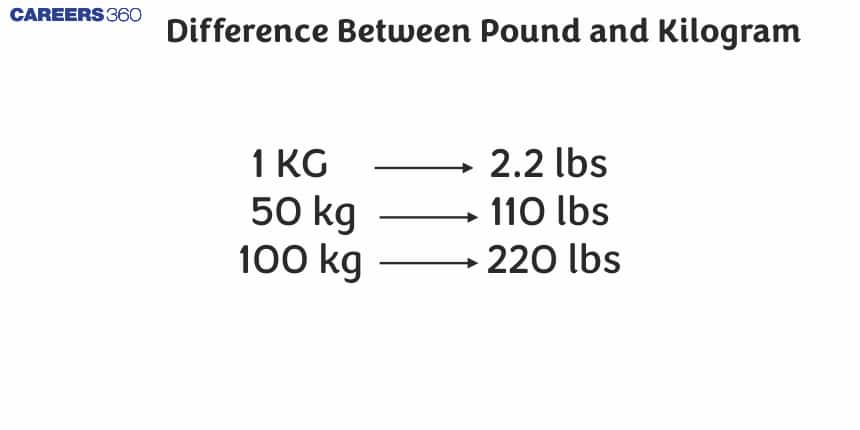Difference Between Pound and Kilogram
In this article , we are going to learn about what is kg and what is lb in weight. Also, learn how to convert from kg to lbs . In other terms , we will learn how many pounds in 1 kg and one pound weight in kilograms. Sometimes we get confused by pounds and lbs. We cannot convert from pounds to lbs because lbs is the short form of pound. So, lbs unit is used to measure mass. Nowadays the pound is frequently used in western countries more than in eastern countries. Kg is the short form of kilogram and lbs full form in weight is pounds. Kilograms and pounds are the unit of mass. Though both are units of mass, so we can convert kg to pounds , lb to kg .
This Story also Contains
- What is a pound?
- What is a kilogram (kg)?
- Difference Between Pound and Kilogram
- Examples of Kilograms to Pounds Conversion
- Examples of Pounds to Kilograms Conversion

Also read -
What is a pound?
A pound (lb) is a unit of mass or weight used mainly in the imperial and US customary systems. It measures how heavy an object is.
One pound is equal to 0.453 kilograms (kg) or 453 grams. The pound is commonly used in countries like the United States and the United Kingdom to measure body weight, food items, and other everyday objects.
Example:
- A person weighing 150 pounds has a mass of about 68 kilograms.
- 1 pound of sugar ≈ 453 grams.
What is a kilogram (kg)?
Kilogram is the international measuring system of mass. Now, we measure mass in Kg .
NCERT Physics Notes :
How many pounds in a kilogram (kg) or how many pounds is 1 kg?
One kg is equal to 2.205 pounds .
1 kg = 2.205 lbs
How many kg in one pound / how much one pound is / 1 pound equal to how many kg?
1 pound is equal / one pound is equal to 0.453 kgs
1 pound in kg, 1 lb = 0.453 Kg
|
Related Topics Link, |
Difference Between Pound and Kilogram
Here’s a simple explanation of the difference between Pound and Kilogram
| Basis of Difference | Pound (lb) | Kilogram (kg) |
| Definition | A pound is a unit of mass used mainly in the imperial system. | A kilogram is the base unit of mass in the metric (SI) system. |
| System Used | Imperial and US customary system | Metric or International System of Units (SI) |
| Symbol | lb or lbs | kg |
| 1 Unit Equivalent | 1 pound = 0.4536 kilograms | 1 kilogram = 2.2046 pounds |
| Common Use | Used mostly in the United States and the UK for body weight and groceries. | Used worldwide for scientific, industrial, and everyday measurements. |
| Measurement Type | Non-SI unit | SI base unit |
Examples of Kilograms to Pounds Conversion
Here are a few solved examples to understand how to convert kilograms (kg) into pounds (lbs):
1. Convert 91 kg to pounds
$
91 \times 2.205=200.655 \mathrm{lbs}
$
2. Convert 59 kg to pounds
$
59 \times 2.205=130.095 \mathrm{lbs}
$
3. Convert 10 kg to pounds
$
10 \times 2.205=22.05 \mathrm{lbs}
$
4. Convert $\mathbf{1 2} \mathbf{~ k g}$ to pounds
$
12 \times 2.205=26.46 \mathrm{lbs}
$
5. Convert 2 kg to pounds
$
2 \times 2.205=4.41 \mathrm{lbs}
$
6. How much does a 1 kg cake weigh in pounds?
$1 \mathrm{~kg}=2.205$ pounds
7. What is half a pound in grams?
$\begin{aligned}
& 0.5 \times 0.453=0.2265 \mathrm{~kg} \\
& 0.2265 \times 1000=226.5 \mathrm{grams}
\end{aligned}
$
$\text { Half a pound = } 226.5 \text { grams }$
Also read :
Examples of Pounds to Kilograms Conversion
Here are a few solved examples to help you understand how to convert pounds (lbs) into kilograms (kg):
1. Convert $\mathbf{1 7 9}$ lbs to $\mathbf{~ k g}$
$
179 \times 0.453=81.087 \mathrm{~kg}
$
2. Convert 22 lbs to kg
$
22 \times 0.453=9.966 \mathrm{~kg}
$
3. Convert 119 lbs to kg
$
119 \times 0.453=53.907 \mathrm{~kg}
$
4. Convert 2.5 lbs to kg
$
2.5 \times 0.453=1.1325 \mathrm{~kg}
$
5. Convert 23 lbs to kg
$
23 \times 0.453=10.419 \mathrm{~kg}
$
6. Convert 2.2 lbs to kg
$
2.2 \times 0.453=0.9966 \mathrm{~kg}
$
7. Convert 13 lbs to kg
$
13 \times 0.453=5.889 \mathrm{~kg}
$
8. Convert 1 pound to grams
$
1 \mathrm{lb}=0.453 \mathrm{~kg}=0.453 \times 1000=453 \mathrm{grams}
$
9. How many grams in one pound cake?
Answer: 1 pound cake = 453 grams
Also check-
Frequently Asked Questions (FAQs)
The force acting on a body due to gravity is known as weight in physics.
Definite quantity of the magnitude of a substance is known as the measuring unit.
S.I system is known as the International system of units .
FPS is known as the foot-pound-second system or imperial system.
CGS is known as centimetre-gram-second or metric system.
1 pound= 0.453 kg
British pound sterling is the full form of GBP.